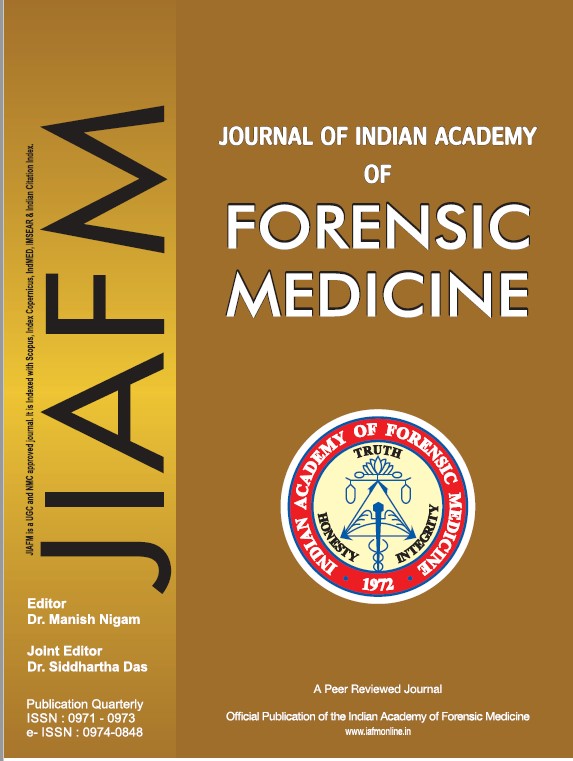Higher Impact Factor: Better Journal? Not a Necessity
DOI:
https://doi.org/10.48165/Keywords:
Impact factor, Bibliometric indicators, Academic JournalAbstract
Often, impact factor (IF) is considered as an important criteria to assess the academic repute of a scientific journal. It is considered as the all important criteria to decide how good the journal is. This has led to a mad rush for publishing articles in journals having higher impact factors. In recent years it has became a dilemma for the new comers to the field that how to search for a “Good” journal for their budding articles. In the present article we are going to discuss the pros and cons of using impact factor as the criteria for judging the quality of the article as well the journal in which it is published. A brief overview about the procedure of imparting impact factor to the journal is also presented. Additionally, a brief description of the other prevalent bibliometric measures is also discussed.
Downloads
References
Dong P, Loh M, Mondry A. The "impact factor" revisited. Biomedical digital libraries. 2005;2:7.
Puche RC. [Impact factor, its variants and its influence in academic promotion]. Medicina. 2011;71(5):484-9.
Seglen PO. Why the impact factor of journals should not be used for evaluating research. BMJ. 1997;314(7079):498-502.
Contributors W. Impact factor: Wikipedia, The Free Encyclopedia; [cited 2013 22 October]. Available from: http://en.wikipedia.org/w/index.php?title=Impact_factor&oldid=5772 69766.
Nisonger TE. The Benefits and Drawbacks of Impact Factor for Journal Collection Management in Libraries. The Serials Librarian. 2004;47(1-2):57-75.
Van Raan A F J vLTN. Assessment of the scientific basis of interdisciplinary, applied research: application of bibliometric methods in Nutrition and Food Research. Research Policy. 2002;31(4):611-32.
Lortie CJ, Aarssen LW, Budden AE, Leimu R. Do citations and impact factors relate to the real numbers in publications? A case study of citation rates, impact, and effect sizes in ecology and evolutionary biology. Scientometrics. 2013;94(2):675-82.
Amin M, Mabe MA. Impact factors: use and abuse. Medicina. 2003;63(4):347-54.
Mazda Farshad CS, Christian Gerber. Association of scientific and nonscientific factors to citation rates of articles of renowned orthopedic journals. European Orthopaedics and Traumatology. 2013;4(3):125-30.
Tsikliras AC. Chasing after the high impact. Ethics Sci Environ Polit. 2008;8:45-7.
Eyre-Walker A, Stoletzki N. The assessment of science: the relative merits of post-publication review, the impact factor, and the number of citations. PLoS biology. 2013;11(10):e1001675.
Paris G, De Leo G, Menozzi P, Gatto M. Region-based citation bias in science. Nature. 1998;396(6708):210.
Wilhite AW, Fong EA. Scientific publications. Coercive citation in academic publishing. Science. 2012;335(6068):542-3.
Steel CM. Read before you cite. Lancet. 1996;348(9021):144. 15. Lawrence PA. The mismeasurement of science. Current biology : CB. 2007;17(15):R583-5.
Michel Zittl EB. Challenges for scientometric indicators: data demining, knowledge-flow measurements and diversity issues. Ethics Sci Environ Polit. 2008;8:49-60.
Kurmis AP. Understanding the limitations of the journal impact factor. The Journal of bone and joint surgery American volume. 2003;85-A(12):2449-54.
Michael T, Pandelis, Perakakis, Varvara, Trachana. The siege of science. Ethics Sci Environ Polit. 2008;8:17-40.
Giske J.Benefitting from bibliometry. Ethics Sci Environ Polit. 2008;8:79–81.
Satyanarayana K. Impact factor and other indices to assess science, scientists and scientific journals. Indian journal of physiology and pharmacology. 2010;54(3):197-212.
Journal metrics: Elsevier B.V.; 2013 [cited 2013 22/10/2013]. Available from: http://www.elsevier.com/editors/journal metrics#further-metrics.
Hirsch JE. An index to quantify an individual's scientific research output. Proceedings of the National Academy of Sciences of the United States of America. 2005;102(46):16569-72.
Contributors W. Google Scholar: Wikipedia, The Free Encyclopedia; [cited 2013 22 October]. Available from: http://en.wikipedia.org/w/index.php?title=Google_Scholar&oldid=57 1105085.
Roberts WC. Piercing the impact factor and promoting the Eigenfactor. The American journal of cardiology. 2011;108(6):896-8. 25. Jones AW. The distribution of forensic journals, reflections on authorship practices, peer-review and role of the impact factor. Forensic science international. 2007;165(2-3):115-28.
Jones AW. Impact factors of forensic science and toxicology journals: what do the numbers really mean? Forensic science international. 2003;133(1-2):1-8.


